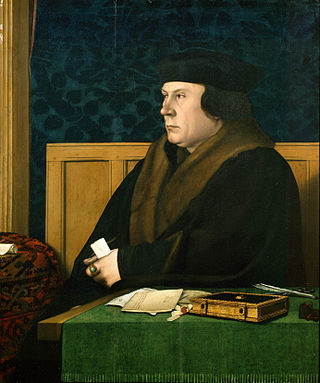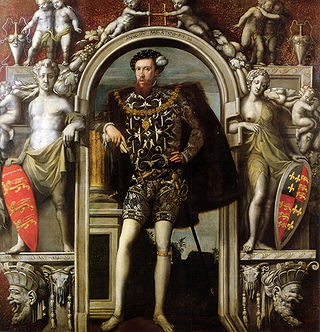
Thomas Cromwell, briefly Earl of Essex, was an English statesman and lawyer who served as chief minister to King Henry VIII from 1534 to 1540, when he was beheaded on orders of the king, who later blamed false charges for the execution.

Henry Howard, Earl of Surrey, KG, was an English nobleman, politician and poet. He was one of the founders of English Renaissance poetry and was the last known person executed at the instance of King Henry VIII. He was a first cousin of the king's wives Anne Boleyn and Catherine Howard. His name is usually associated in literature with that of the poet Sir Thomas Wyatt. Owing largely to the powerful position of his father, Thomas Howard, 3rd Duke of Norfolk, Surrey took a prominent part in the court life of the time, and served as a soldier both in France and Scotland. He was a man of reckless temper, which involved him in many quarrels, and finally brought upon him the wrath of the ageing Henry VIII. He was arrested, tried for treason and beheaded on Tower Hill.

Henry FitzRoy, Duke of Richmond and Somerset,, was the son of King Henry VIII of England and his mistress, Elizabeth Blount, and the only child born out of wedlock whom Henry VIII acknowledged. He was the younger half-brother of Queen Mary I, as well as the older half-brother of Queen Elizabeth I and King Edward VI. Through his mother, he was the elder half-brother of the 4th Baroness Tailboys of Kyme and of the 2nd and 3rd Barons Tailboys of Kyme. He was named FitzRoy, which is derived from the Norman French term for "son of the king".

Sir Anthony Denny was Groom of the Stool to King Henry VIII of England, thus his closest courtier and confidant. He was the most prominent member of the Privy chamber in King Henry's last years, having together with his brother-in-law, John Gates, charge of the "dry stamp" of the King's signature, and attended the King on his deathbed. He was a member of the Reformist circle that offset the conservative religious influence of Bishop Gardiner. He was a wealthy man, having acquired several manors and former religious sites distributed by the Court of augmentations after the Dissolution of the Monasteries. By 1548, he was keeper of the Palace of Westminster.
Elizabeth Holland, commonly known as Bess Holland, was the mistress of Thomas Howard, 3rd Duke of Norfolk and maid-of-honour to his niece, Anne Boleyn, the second wife of Henry VIII of England. The daughter of the Duke's secretary, she had worked for eight years as a laundress in the household of Norfolk's wife, Elizabeth Stafford, Duchess of Norfolk.
François van der Delft, was Imperial ambassador to the court of Henry VIII of England from 1545 to 1547 and ambassador to the court of Edward VI of England from 1547 to 1550.
Sir John Gates KB (1504–1553) was an English courtier, soldier and politician, holding influential household positions in the reigns of Henry VIII and Edward VI. As one of the Chief Gentlemen of the Privy Chamber under Edward VI, he became a follower of John Dudley, 1st Duke of Northumberland and was a principal participant in the attempt to establish Lady Jane Grey on the English throne. Because of this, he was executed for high treason under Mary I.
Louis de Perreau, Sieur de Castillon was the French ambassador to England during the reign of Henry VIII. He served at the English court from November 1537 to December 1538 and was replaced by Charles de Marillac. His predecessor was Antoine de Castelnau.
Luis Caroz was the Imperial ambassador to the court of Henry VIII of England between 1509 and 1514. He represented Ferdinand of Aragon, the King's father-in-law as Henry's wife at the time was Catherine of Aragon.
Ludovico da l'Armi was an assassin hired by Henry VIII of England to kill the King's cousin and critic, Cardinal Pole. Da l'Armi was an Italian mercenary and the nephew of Cardinal Campeggio.
Lorenzo Pasqualigo was a Venetian at the court of Henry VIII of England. He was based in London, and his brother, Pietro Pasqualigo, was the Venetian ambassador to Lisbon. Lorenzo's extant letters have been used to learn about the early travels of John Cabot to the American coastline.
Alice Wilkes was a servant to Katherine Howard, the fifth wife of Henry VIII of England and was a significant witness in Queen Katherine's trial for treason and adultery.
Otwell Johnson was a successful merchant in England during the reign of Henry VIII. His chronicle is one of the main sources detailing the execution of Henry's fifth wife, Katherine Howard.
A Treaty of Perpetual Peace was signed in 1534 between James V of Scotland and Henry VIII of England.
Walter Cromer was a doctor to Henry VIII of England.
Bath Place was a prominent London residence that had belonged to the Bishops of Bath and was near the King's residence.
Michael Throckmorton was a 16th-century English Catholic who went into exile with Cardinal Pole during the reign of Henry VIII of England.
Sir Gregory Botolf, also known as Sir Gregory Sweet-Lips was an English knight and cleric who fell foul of Henry VIII of England for his adherence to the papacy. He was pursued by Henry's agents in Belgium but was released due to papal pressure.
Robert Brancetour was a 16th-century English merchant who was a member of the court of Charles V, Holy Roman Emperor. He was attainted by Henry VIII who repeatedly tried to have Brancetour arrested, but was thwarted by Charles V's protection. Brancetour was an associate of Cardinal Pole.
Dick Hosier, also known as Blanche Rose was a Welsh fugitive pursued by the agents of Henry VIII of England after his flight to France in 1531. Due to the English ambassador to France, Francis Bryan's, influence, Dick was imprisoned for eight years in Paris. The French refusal to have him sent to Henry, insisting that he was a French subject born in Orleans, was central in the demands of Henry VIII in 1543 as the two countries prepared for war.



